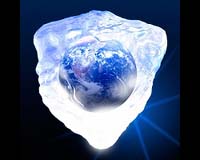


Notice: This is the official website of the All Empires History Community (Reg. 10 Feb 2002)
Thaw point: 'Snowball Earth' was more a slushball |
Post Reply 
|
| Author | |
Spartakus 
Tsar 

terörist Joined: 22-Nov-2004 Location: Greece/Hellas Online Status: Offline Posts: 4489 |
 Quote Quote  Reply Reply
 Topic: Thaw point: 'Snowball Earth' was more a slushball Topic: Thaw point: 'Snowball Earth' was more a slushballPosted: 06-Dec-2007 at 09:17 |
|
Thaw point: 'Snowball Earth' was more a slushball
Paris (AFP) Dec 5, 2007 An extraordinary episode of global cooling hundreds of millions of years ago that some experts say caused Earth to completely freeze over has been miscalculated, a new study says. Instead of "Snowball Earth," the planet really became "Slushball Earth," its authors suggest. The great chill -- the longest and deepest ice age in Earth's known history -- happened during the late Neoproterozoic era, 850 to 542 million years ago. The evidence for the Snowball thesis comes from deep sediments in the ocean. Scientists look through these layers to measure levels of the isotope carbon 13 (C13), deposited in plants through photosynthesis, as a telltale of Earth's climate. Above and below the Cryogenian layer is an abundance of C13. But the Cryogenian layer itself has negligible levels of this isotope. Coupled with other signs of intense glaciation, the explanation is that Earth froze over completely -- thick ice covered the oceans and glaciers crept down into the tropics, possibly even reaching the equator. The brilliant white shell reflected back the Sun's rays, and thus its heat, so well that the Snowball persisted for nearly 200 million years. Eventually the greenhouse gas carbon dioxide (CO2), welling up from volcanoes, escaped into the air and thankfully set the planet onto a warming trend, and so the icy blanket was melted. This scenario, first aired in 1989 and still fiercely contested, has now come under assault from a new angle by a trio of physicists at the University of Toronto, Canada. They have devised a computer simulation of the CO2 during the late Neoproterozoic that factors in the role of oxygen in the ocean. Progressive cooling would have allowed atmospheric oxygen to spread more deeply into the sea, transforming rich layers of dissolved organic carbon -- formerly created by photosynthesis -- into CO2, they say. This CO2, released back into the atmosphere, warmed up the atmosphere through the greenhouse effect sufficiently to induce thawing, causing sea ice and glaciers to shrink, before a cooling cycle resumed. In other words, the Cryogenian would have been a milder, slushier, shorter affair, with ice-free seas in the tropics where sunlight would have generated photosynthesis, rather than a deep, long, planetary freeze. The ice age would not have required massive amounts of volcanic CO2 to end, nor would it have been delayed by millions of years. In a commentary, which like the study appears in Thursday in the British journal Nature, US geologist Alan Kaufman questions Peltier's assumption that levels of atmospheric oxygen were similar to today's level -- a relatively high 21 percent of the air. "Biological and geochemical evidence indicates that oxygen levels were low throughout most of the Neoproterozoic, with a significant rise in breathable air around 550 million years ago -- about the time animals first appeared on the planet," says Kaufman. The Snowball debate has a bearing on another great enigmatic episode in Earth's history called the "Cambrian Explosion" -- the dramatic breakout of biodiversity that happened after the Neoproterozoic. The microfossil record from this time is so emphatic that no one doubts that the Explosion happened. Critics of the Snowball theory say that such a prolonged deep glaciation would have destroyed all life, leaving nothing left -- or at least very little -- to explain this sudden, riotous diversity. Snowball supporters, though, argue that hardy microscopic biota survived unscathed during the long chill, thriving in shallow sea waters or melt pools on land in the tropics, or in thermal vents on the sea bed. When the Snowball melted, these organisms grew swiftly in size and complexity, becoming the new masters of the planet, they contend. http://www.terradaily.com/reports/Thaw_point_Snowball_Earth_was_more_a_slushball_999.html |
|
|
"There are worse crimes than burning books. One of them is not reading them. "
--- Joseph Alexandrovitch Brodsky, 1991, Russian-American poet, b. St. Petersburg and exiled 1972 (1940-1996) |
|
 |
|
Adalwolf 
Chieftain 
Joined: 08-Sep-2006 Location: United States Online Status: Offline Posts: 1230 |
 Quote Quote  Reply Reply
 Posted: 10-Dec-2007 at 00:05 Posted: 10-Dec-2007 at 00:05 |
|
Interesting!
|
|
|
Concrete is heavy; iron is hard--but the grass will prevail.
Edward Abbey |
|
 |
|
Post Reply 
|
| Forum Jump | Forum Permissions  You cannot post new topics in this forum You cannot reply to topics in this forum You cannot delete your posts in this forum You cannot edit your posts in this forum You cannot create polls in this forum You cannot vote in polls in this forum |
Copyright ©2001-2009 Web Wiz
This page was generated in 0.063 seconds.











 Printable Version
Printable Version Google
Google Delicious
Delicious Digg
Digg StumbleUpon
StumbleUpon Windows Live
Windows Live Yahoo Bookmarks
Yahoo Bookmarks reddit
reddit Facebook
Facebook MySpace
MySpace Newsvine
Newsvine Furl
Furl Topic Options
Topic Options